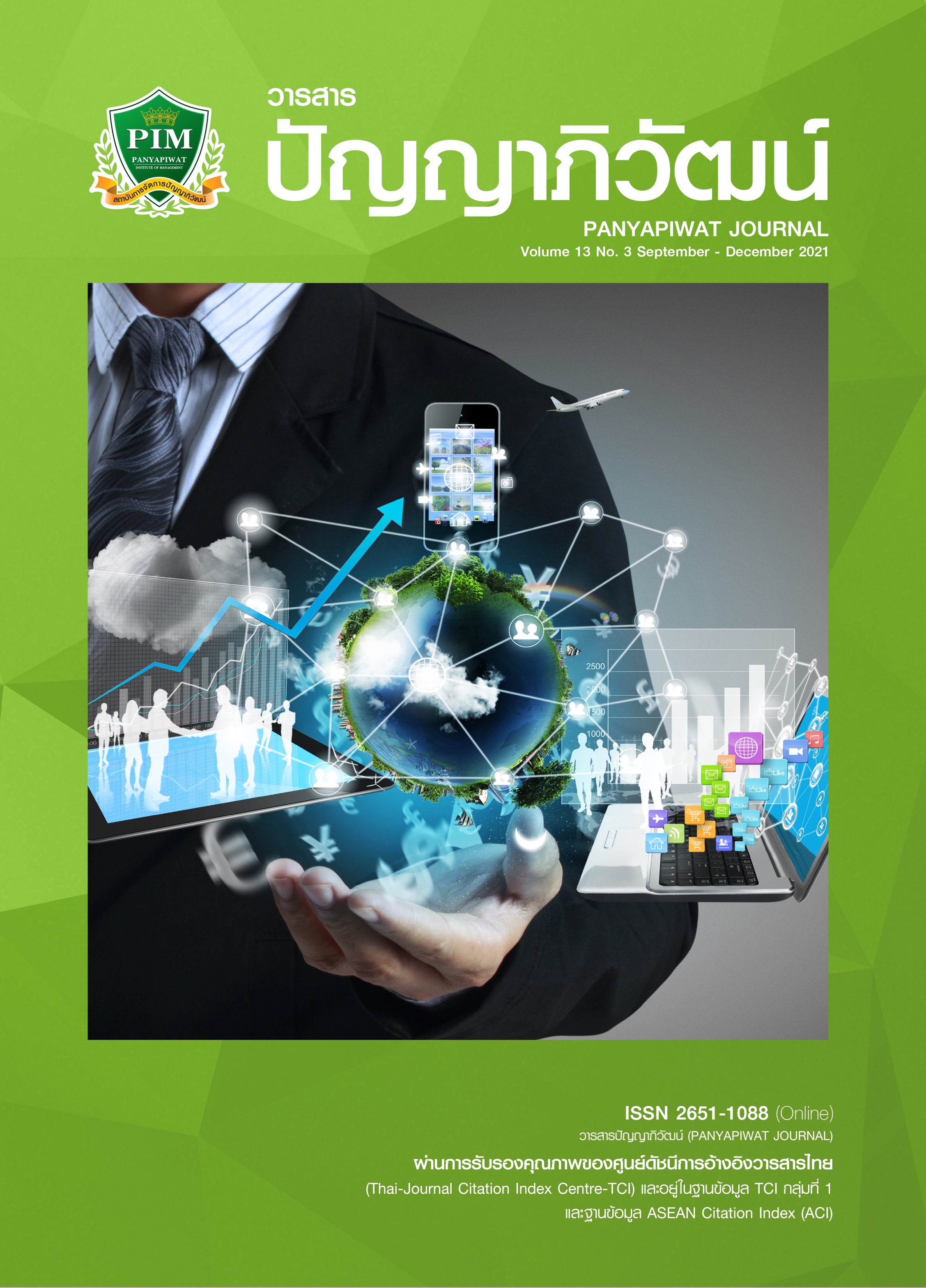การพัฒนาบทเรียนออนไลน์แบบเปิดเพื่อมหาชน รายวิชา หมากล้อมกับการพัฒนาความคิดทางธุรกิจ
Main Article Content
บทคัดย่อ
การวิจัยครั้งนี้มีวัตถุประสงค์เพื่อ 1) พัฒนาบทเรียนออนไลน์แบบเปิดเพื่อมหาชน รายวิชา หมากล้อม กับการพัฒนาความคิดทางธุรกิจ 2) เปรียบเทียบผลสัมฤทธิ์ทางการเรียนด้วยบทเรียนออนไลน์แบบเปิดเพื่อ มหาชน รายวิชา หมากล้อมกับการพัฒนาความคิดทางธุรกิจระหว่างหลังเรียนและก่อนเรียน และ 3) ศึกษาความ พึงพอใจของผู้เรียนต่อบทเรียนออนไลน์แบบเปิด กลุ่มตัวอย่างในการวิจัยครั้งนี้คือ ผู้วิจัยสุ่มนักศึกษาและ บุคคลทั่วไปผู้สนใจในรายวิชานี้ จำนวน 30 คน โดยวิธีการสุ่มอย่างง่าย เครื่องมือที่ใช้ในการศึกษาครั้งนี้ ประกอบด้วย 1) แบบทดสอบวัดผลสัมฤทธิ์ทางการเรียนรายวิชาหมากล้อมกับการพัฒนาความคิดทางธุรกิจ 2) แบบสอบถามความพึงพอใจต่อบทเรียนออนไลน์แบบเปิด 3) บทเรียนออนไลน์แบบเปิด รายวิชา หมากล้อม กับการพัฒนาความคิดทางธุรกิจ สถิติที่ใช้ในการวิเคราะห์ข้อมูลประกอบด้วย สถิติบรรยาย ค่าเฉลี่ย ส่วน เบี่ยงเบนมาตรฐาน และสถิติทดสอบทีแบบไม่เป็นอิสระต่อกัน
ผลการศึกษาพบว่า 1) ผลการพัฒนาบทเรียนออนไลน์แบบเปิดเพื่อมหาชน รายวิชา หมากล้อมกับ พัฒนาความคิดทางธุรกิจ มี 10 บท ประกอบด้วย 1.1) ก้าวแรกสู่หมากล้อม 1.2) กติกา 3 ข้อ และ 1 ข้อห้าม 1.3) กลยุทธ์การเดินหมากช่วงต่างๆ 1.4) ความแข็งแรงของกลุ่มหมาก 1.5) กลเม็ดเคล็ดไม่ลับ 1.6) เทคนิค การจับกินขั้นสูง 1.7) การสร้างและทำลายสองห้อง 1.8) สองห้องเชิงลึก 1.9) แวดวงหมากล้อม และ 1.10) เราเรียนรู้อะไรจากการฝึกหมากล้อม มีค่าความเที่ยงตรงเชิงเนื้อหาเท่ากับ 0.67 และ 1.00 2) ผลสัมฤทธิ์ทาง การเรียนของผู้เรียนหลังเรียนด้วยด้วยบทเรียนออนไลน์แบบเปิดเพื่อมหาชนสูงกว่าก่อนเรียน อย่างมีนัยสำคัญ ทางสถิติที่ระดับ .05 และ 3) ผู้เรียนมีความพึงพอใจต่อบทเรียนออนไลน์แบบเปิดเพื่อมหาชน รายวิชาหมากล้อม กับพัฒนาความคิดทางธุรกิจในภาพรวมอยู่ในระดับมาก ( = 4.13, S.D. = 0.78)
Article Details
“ข้าพเจ้าและผู้เขียนร่วม (ถ้ามี) ขอรับรองว่า บทความที่เสนอมานี้ยังไม่เคยได้รับการตีพิมพ์และไม่ได้อยู่ระหว่างกระบวนการพิจารณาลงตีพิมพ์ในวารสารหรือแหล่งเผยแพร่อื่นใด ข้าพเจ้าและผู้เขียนร่วมยอมรับหลักเกณฑ์การพิจารณาต้นฉบับ ทั้งยินยอมให้กองบรรณาธิการมีสิทธิ์พิจารณาและตรวจแก้ต้นฉบับได้ตามที่เห็นสมควร พร้อมนี้ขอมอบลิขสิทธิ์บทความที่ได้รับการตีพิมพ์ให้แก่สถาบันการจัดการปัญญาภิวัฒน์หากมีการฟ้องร้องเรื่องการละเมิดลิขสิทธิ์เกี่ยวกับภาพ กราฟ ข้อความส่วนใดส่วนหนึ่งและ/หรือข้อคิดเห็นที่ปรากฏในบทความข้าพเจ้าและผู้เขียนร่วมยินยอมรับผิดชอบแต่เพียงฝ่ายเดียว”
เอกสารอ้างอิง
Amnuayporn, P., Yampinij, S., Meejaleurn, S., & Supaluk, S. (2019). Developing the Media of Game Based Learning Using Gamification Strategy to Enhance Computational Thinking on Computing Science Subject for Students in Primary Year 2. Journal of Education: Faculty of Education: Srinakarinwirot University, 20(2), 68-78.
Bellanca, J., & Brandt, R. (2011). 21st Century Skills: Rethinking How Students Learn [21st Century Skills: Rethinking How Students Learn] (W. Wongkitrungruang, & A. Jittalerk, Trans.). Bangkok: Open Worlds. (2010). [in Thai]
Brahmawong, C. (2006). Technology and Educate Communication: Unit 11-15 (2nd ed.). Nonthaburi: The Office of the University Press Sukhothai Thammathirat Open University. [in Thai]
Castanza, G. E. (2011). Curriculum Guide for Go in Schools. Retrieved May 26, 2020, from https://www.usgo.org/sites/default/files/pdf/CastanzaLessonPlans.pdf
Chaimin, C. (2019). MOOC: Life long learning in the 21st century. Journal of Humanities and Social Sciences, CMRU, 1(1), 46-70. [in Thai]
Chairasmisak, K. (2009). Eastern CEO (6th ed.). Bangkok: Siamintercomics. [in Thai]
Cobb, W. S. (2005). Reflections on the Game of Go: The Empty Board: 1994-2004. Richmond: Slate & Shell.
Coto, L. (2017). Why Leader-member Exchange is Important to Business Thinking. Doctor of Philosophy Psychology, Walden University.
Feurer, R. & Chaharbaghi, K. (1995). Strategy Development: Past, Present and Future. Management Decision, 33(6), 11-21.
Henkel, H. (2011). Can Strategic Thinking be Taught? Journal of Strategic Leadership, 3(1), 1-6.
Horth, D. & Buchner, D. (2014). Innovation Leadership: How to Use Innovation to Lead Effectively. Retrieved November 16, 2021, from https://encc.eu/sites/default/files/2016-11/InnovationLeadership%20.pdf
Jeong, S., Kim, B., Kim, S., & Cha, C. (2009). Analysis of Problems of the Current Baduk Education in Korea. In The 6th International Conference on Baduk (pp. 93-104). Jeon Ju Korea: Korean Society for Baduk Studies Dept. of Baduk Studies, MyongJi University.
Kerr, E. G. (2011). Exploring Project Management by Exploiting Analogy with the Game of Go. Doctor of Philosophy in Strategy, Programme & Project Management, SKEMA Business School.
National Strategy Secretariat Office. (2018). Royal Gazette Volume 135 Part 82. Retrieved November 16, 2021, from https://www.nesdc.go.th/download/document/SAC/NS_PlanOct2018.pdf [in Thai]
Office of National Higher Education Science Research and Innovation Policy Council and Thailand Science Research and Innovation. (2019). Policy and Strategy of Thailand HESI 2020-2027 and Thailand SRI Plan 2020-2022. Retrieved November 24, 2020, from https://backend.tsri.or.th/files/trf/2/docs/Policy_and_Strategy_of_Thailand_HESI_2563-2570_and_Thailand_
SRI_Plan_2563-2565.pdf [in Thai]
Ongkrutraksa, W. (2021). The Use of MOOC in a Blended Environment of International Advertising and Marketing Communications Course. Journal of Rattana Bundit University, 16(1), 50-64.
Pungchompoo, W., Suwankruhasn, N., & Saengrut, B., (2017). Developing of Innovation in Nursing Education: A Massive Open Online Course (MOOC) in Gerontological Nursing. Nursing Journal, 44(Special 2), 103-110. [in Thai]
Putong, P. (2017). The Development of E-Learning in The Topic of “Gen Y Students’ Presentations Programme” in The Private Higher Education Institution. Panyapiwat Journal, 9(Special), 227-234. [in Thai]
Puttapitukpol, S., Chankong, W., Manachevakul, S., & Pensirinapa, N., (2018). A Development of an Online Course on the Universal Coverage Scheme for In-service Education of Health Personnel in Thailand. Thai Journal of Cardio-Thoracic Nursing, 29(1), 2-15. [in Thai]
Ruttanateerawichien, K. (2012). The Development of Online Tutorials on Basic Algorithm Course about Flowcharts Writing for Undergraduate Students in Lampang Rajabhat University. Lampang Rajabhat University Journal, 1(1), 99-110. [in Thai]
Rumsey, R. (2020). Business Thinking for Designers. Retrieved November 16, 2021, from https://www.designbetter.co/business-thinking-for-designers
Shotwell, P. (2003). Go! More than Game. North Clarendon: Tuttle Publishing.
Smith, G. F. (2014). Assessing Business Student Thinking Skills. Journal of Management Education, 38(3), 384-411.
Tinnawas, N. & Thammetar, T. (2016). The Study of Massive Open Online Course Model for Thai Higher Education. Veridian E-Journal, Silpakorn University, 9(3), 1463-1479. [in Thai]
Watson, A. & Chatterjee, S. (2006). Going International: What We Can Learn about International Strategy, Market Entry, and Resource Allocation from the Game of Go. Journal of Teaching in International Business, 17(4), 5-25.


